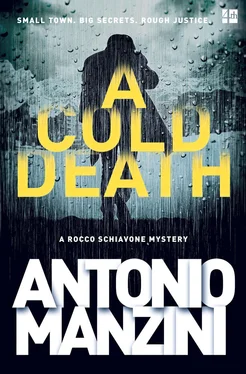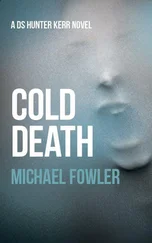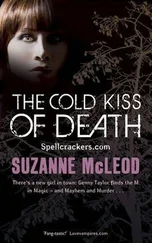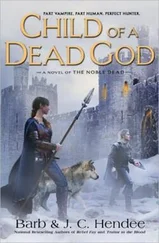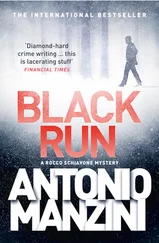“Signora?”
She slid the pocket door to one side and walked into the living room.
The place was a mess. On the low table in front of the TV sat a tray with the remains of dinner still on it. Chicken bones, a squeezed lemon, and greenish scraps. Spinach, maybe. Crumpled up on the sofa was an emerald-green blanket and in the ashtray were a dozen cigarette butts. Irina decided that the signora was most likely in her bedroom with a fever, and that last night her husband, Patrizio, had eaten dinner alone and watched the soccer game. Otherwise there would have been two trays, his and Signora Esther’s. The pages of the Corriere dello Sport were scattered all over the carpet, and a drinking glass had left two distinct rings on the antique blond wood table. Shaking her head, Irina walked over to clear up: one foot kicked an empty wine bottle and it went rolling across the floor. Irina picked up the bottle and set it on the low table. Then she took the ashtray and dumped the butts into the plate with the stale food. “Signora? Are you in there? Are you in bed?”
No answer.
With both hands occupied by the tray and precariously balancing the bottle of merlot, she bumped the kitchen door open with one hip. But she didn’t walk through the door. She froze and stood staring. “What on earth …?” she half-muttered to herself.
The pantry doors swung open. The floor was covered with dishes, utensils, and glasses alongside boxes of pasta and cans of tomato paste. Tablecloths, dish towels, silverware, and paper napkins were strewn everywhere. Oranges had rolled to the base of the half-open refrigerator. Chairs were knocked over, the table was shoved almost against the wall, and the handheld electric mixer that lay shattered on the floor tiles spewed wires and electric gadgets out of its belly.
“What happen here!” Irina shouted. She set down the tray and turned toward the hallway.
“Signora Esther!” she called again. No answer. “Signora Esther, what happen here?”
She hurried into the bedroom, hoping to find the signora there. The bed was unmade. Sheets and duvet heaped in a corner. The armoire thrown wide open. She backed away, cautiously, toward the kitchen. “But what …?” Then her foot hit something on the floor. She looked down. A cell phone, shattered.
“Burglars!” she shouted and, as if someone had placed a cold, menacing blade against her back, she stiffened, turned, and ran. The antique afghan carpet that lay rumpled on the floor tripped her up. Irina sprawled headlong and banged her knee on the floor.
Chunk!
The muffled sound of a kneecap cracking, followed by a stabbing pain penetrating directly into her brain. “Aahh!” she screamed through clenched teeth, and holding her knee with both hands she got to her feet. She aimed straight toward the sliding pocket entrance door, certain that behind her lurked a couple of scary-looking men, their faces concealed by balaclavas, black, and with the sharp teeth of ferocious beasts. She banged her shoulder against the panel of the sliding door, and it quavered, shivering the smoked glass. Now another stab of pain sank its fangs deep into her clavicle. But this one she felt less. Irina mustered all the adrenaline she had in her body and limped out of the Baudos’ apartment. She hastily slid the door shut behind her. She was panting. Now that she was on the landing she felt a little safer. She looked down at her knee. Her stocking was torn and drops of blood stained her pale white flesh. She licked two fingers and ran them over the wound. The pain had shifted from keen to dull and throbbing, but it was now a little easier to take. Then it dawned on her that she was not even remotely safe on the landing. If the burglars were inside the apartment, how hard would it be for them to open the door and slaughter her, to stab her with a knife or beat her to death with a crowbar? She started limping gingerly down the stairs and shouting: “Help! Burglars! Burglars!”
She pounded on the doors facing the third-floor landing, but no one came to answer. “Help! Burglars! Open up! Open up!”
She continued downstairs. If she could, she would have been taking the steps two at a time, but her knee wouldn’t let her. She held tight to the handsome wooden handrail and thanked God that she’d put on the counterfeit Hogan sneakers that morning, sneakers that she’d purchased at the flea market near her house: at least they had rubber soles. If she’d been wearing leather soles on those marble steps, she could easily have slid down two or three flights flat on her ass. She tried knocking on the second-floor doors. She pounded with her fists, pushed the doorbells, and even kicked, but there was no one home. No one came to the door. Only from one apartment did she hear the hysterical yapping of some tiny dog answering her knock.
A building full of dead people, she thought to herself.
Finally she reached the ground floor. She tugged open the front door and lurched out into the street. It was deserted. Nothing in sight, not even a shop or a bar where she could ask for help. She looked at the buildings lining Via Brocherel. No one at the windows, no one entering or leaving. The sky was leaden and gray. There were no cars. At ten in the morning it seemed as if the world had ground to a halt, at least in that street: as if it were paralyzed, as if she were the only living creature in the whole neighborhood. “Help!” she screamed at the top of her lungs. Then, as if by some miracle, an old man appeared at the corner wrapped in a heavy scarf with a little mutt dog on a leash. Irina ran straight toward him.
Retired army warrant officer Paolo Rastelli, born in 1939, lurched to a halt in the middle of the sidewalk. A woman with no overcoat, her hair standing straight up, and limping with a badly bloodied knee was galloping straight at him, her mouth gaping like a new-caught fish. She was shouting something. But the warrant officer couldn’t hear what it was. All he saw was her mouth wide open, as if she were chewing the chilly air. He decided to turn on the Maico hearing aid he wore in his right ear, which he always kept off when he took Flipper out for his walks. Flipper was a mix of Yorkshire terrier and thirty-two other breeds. The dog was more volatile than a flask of nitroglycerine. A dry leaf in the wind, water gurgling down a runoff pipe, or just Flipper’s diseased imagination was enough to set that fourteen-year-old mutt off, yapping in an irritating high-pitched bark that sent shivers up and down Rastelli’s spine, worse than fingernails on a blackboard. As soon as he switched it on, the hearing aid shot a burst of electric static into his brain. Then, as he expected, the white noise sharpened into Flipper’s shrill yapping, until he could finally hear words with some meaning pouring out of the woman’s open mouth: “Help, help, somebody help me! Burglars!”
Flipper had lost most of the vision in his right eye, and his left eye had been useless for years. The dog wasn’t barking at the woman, he was barking at a traffic sign tossing and clattering in the wind on the other side of the street. Paolo Rastelli had only seconds to make up his mind. He looked behind him: there was no one in sight. There wasn’t time to pull out his cell phone and call the police; by now the woman was just yards away, galloping toward him as if demonically possessed, shouting all the while: “Help! Help me, Signore!” He could turn and run from that latter-day fury with her straw-blond hair, but first he’d have to reckon with the pin in his hip and his wheezing lungs, already on the verge of emphysema. And so, just as when he was a raw recruit, a private standing guard at the munitions dump, he remained rooted to the spot, standing to attention, waiting for trouble to wash over him with all the ineluctability of malicious fate, cursing Flipper and the dog’s midmorning walks, cursing at the constant need to take a tiny yapping dog out to piss and break off work on his crossword puzzles.
Читать дальше
